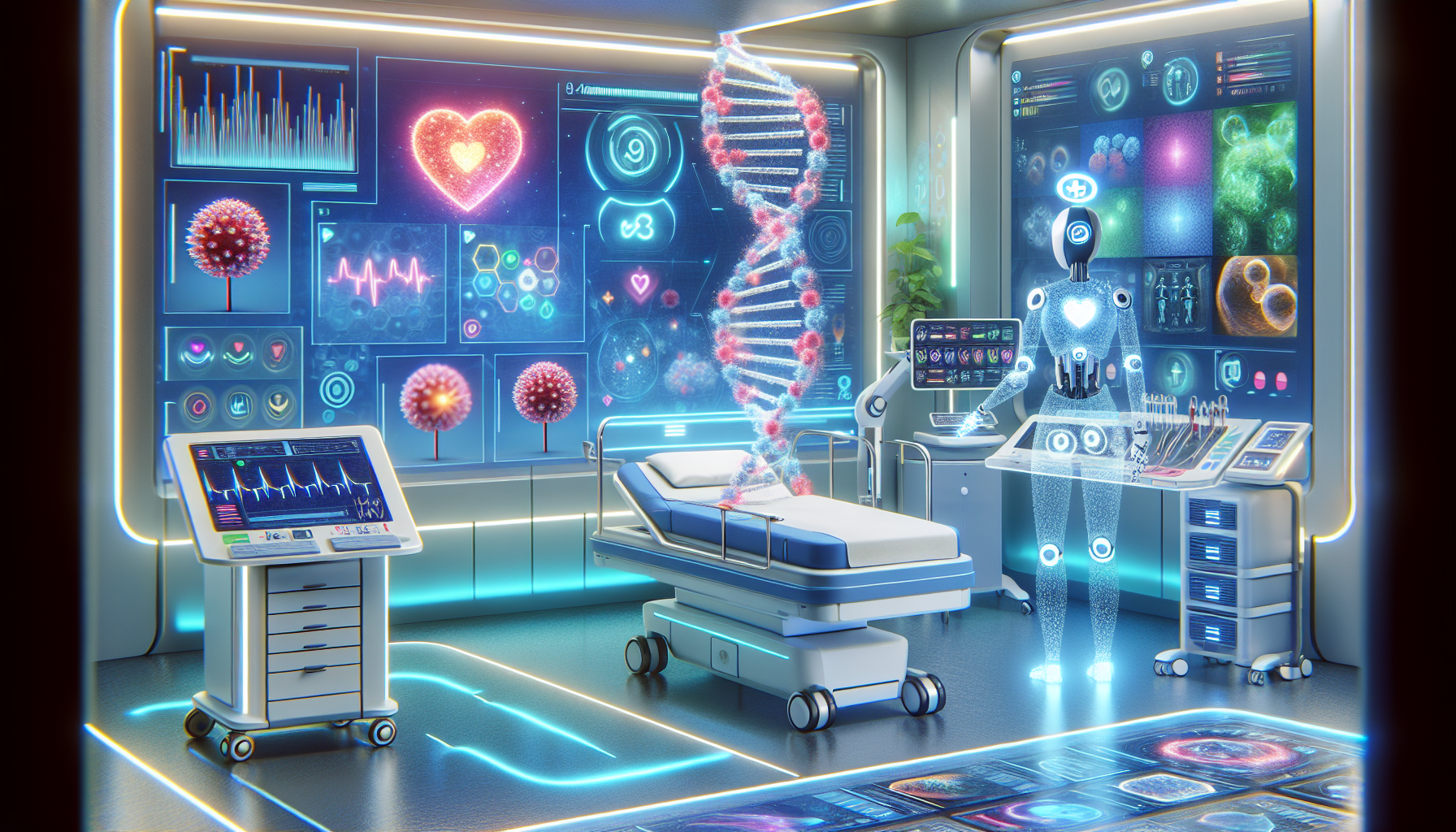
As health AI startups take center stage in transforming healthcare, understanding which companies are leading the charge has never been more critical. This piece will unveil the key players in 2024 and their roles in advancing patient care, from enhancing diagnostics and treatments to optimizing hospital operations.
Key takeaways
- AI startups are playing a crucial role in health care innovation, advancing precision medicine, revolutionizing medical imaging, and streamlining clinical trials to improve patient outcomes.
- AI is improving patient engagement, optimizing care team efficiency, and enabling effective remote monitoring, thereby transforming patient care and care coordination.
- AI-driven solutions are enhancing operational aspects of healthcare providers by automating revenue management, reducing administrative burdens, and improving data standardization for operational excellence.
Emerging AI innovators in healthcare

Leading the way in revolutionizing healthcare is a new wave of healthcare startups that are utilizing cutting-edge technologies and creative strategies to reshape the industry. Through groundbreaking precision medicine techniques, disruptive advancements in medical imaging, and streamlined approaches to clinical trials, these AI startups are making remarkable progress across multiple fronts within healthcare.
Pioneering precision medicine
The emerging field of precision medicine is being significantly impacted by the growth of AI startups. These companies utilize advanced analysis techniques to examine extensive patient data, allowing them to create tailored treatment plans that take into account an individual’s medical history, genetics, lifestyle choices and other relevant factors.
Not only do these personalized treatment approaches enhance the effectiveness of medical care, but they also have a positive impact on overall patient outcomes. By leveraging comprehensive patient data, AI-driven startups are able to improve traditional methods and provide patients with more successful healthcare solutions.
Revolutionizing medical imaging
Innovative AI companies like Mediwhale and Lunit are pushing the boundaries of medical imaging through the use of deep learning and artificial intelligence. These advanced technologies have not only accelerated the diagnostic process, but also assisted radiologists in quickly identifying abnormalities within patient images.
The integration of patients’ medical histories has enhanced accuracy and speed in diagnoses, ultimately resulting in improved patient outcomes. By harnessing cutting-edge AI technology and implementing deep learning techniques into traditional medical practices such as imaging, these startups are revolutionizing healthcare for better patient results.
Streamlining clinical trials
In the realm of clinical trials, artificial intelligence startups such as Evidation and myTomorrows are leveraging AI to improve patient recruitment methods and accelerate drug development processes. By utilizing advanced technology, these companies are able to streamline patient monitoring procedures, speed up identification and enrollment of participants in specific groups or cohorts, as well as efficiently screen potential candidates, all contributing to an overall increase in efficiency within clinical trial operations.
Top 5 rising stars of healthcare AI
Ubie (Japan): Established in 2017, Ubie focuses on AI-powered healthcare services. They’ve partnered with Pfizer and Takeda and offer SaaS products for hospitals and AI-driven symptom trackers.
Funding: $21.6M
Rhino Health (USA): Founded in 2020, Rhino Health facilitates medical researchers and AI developers in accessing diverse datasets to create better AI algorithms for healthcare.
Funding: $16.05M
Employees: 11 to 50
Akasa (USA): Since 2018, Akasa has been providing AI-powered revenue cycle management solutions to healthcare providers, helping in efficiency and error reduction.
Headquarters: South San Francisco, CA
Funding: $85M
CEO: Malinka Walaliyadde
Owkin (USA, France): Owkin, started in 2016, specializes in AI-driven treatments for medical needs, particularly cancer, focusing on drug candidates and diagnostic tools.
Funding: $255M
Headquarters: New York, NY
CEO: Thomas Clozel
Employees: 350
Babylon Health (UK): Founded in 2013, they are revolutionizing healthcare with a focus on preventative care using a scalable, digital-first platform.
Funding: $1.2B
Employees: 2,189
Headquarters: West Lake Hills, TX
CEO: Ali Parsa
Top 5 innovative health AI startups

Tambua Health (USA): Started in 2018, they develop portable ultrasound imaging technology and focus on non-invasive, radiation-free lung imaging using acoustic technology.
Funding: $3.1M
Employees: 19
CEO: Lewis Wanjohi

Octopus.Health (Israel): Since 2018, Octopus.Health has been improving patient adherence and clinical management through personalized AI solutions.
CEO: Yoav Ariav

VIEBEG (Rwanda): Founded in 2018, VIEBEG uses AI for optimizing medical supply chains in East and Central Africa, addressing the challenges in these regions.
Funding: $2.1M
Employees: 11-50
CEO: Tobias Reiter

Sweetch (Israel): Established in 2013, Sweetch offers an AI-based platform for chronic disease management, integrating a fully automated digital therapeutic solution.
CEO: Dr. Yossi Bahagon
Headquarters: Tel Aviv-Yafo
Employees: 51-100

Celéri Health (USA): Started in 2018, they focus on patient-reported outcome tools to inform care for chronic pain patients, integrating with various health devices.
Headquarters: Conshohocken, PA
CEO: Sean McCrossen
Top 5 emerging game-changers in medical AI
Recursion Pharmaceuticals (USA): A biotechnology startup from 2013, Recursion combines AI with drug discovery, focusing on decoding biology and technology integration.
Headquarters: Salt Lake City, UT
CEO: Chris Gibson
Employees: 500
Concerto HealthAI (USA): Since its inception, Concerto HealthAI has been a leader in AI and real-world evidence services for precision oncology.
Headquarters: Cambridge, MA
CEO: Jeff Elton
Immunai (USA): Immunai, founded recently, combines single-cell genomics with ML algorithms for high-resolution profiling of the immune system.
Headquarters: New York, NY
Funding: $295M
CEO: Noam Solomon
BenevolentAI (UK): A leading AI company in health and drug development, focusing on discovering biomarkers and mechanisms associated with diseases.
Headquarters: Bitbourg, Luxembourg
Funding: $292M
Employees: 405
CEO: Dr. Joerg Moeller
Viz.ai (USA): Specializing in medical imaging, Viz.ai uses deep learning to optimize emergency treatment.
Headquarters: San Francisco, CA
Funding: $151.6M
CEO: Chris Mansi
Trailblazers in patient engagement and care coordination

The presence of AI startups is greatly influencing patient engagement and care coordination by improving the overall patient experience, increasing efficiency within care teams, enabling remote monitoring capabilities, ultimately leading to improved patient outcomes.
Enhancing patient experience
AI tools play a major role in enhancing the patient experience. By offering personalized care plans that are tailored to each person’s unique health needs and lifestyle, these tools guide patients towards more targeted and effective healthcare. As a result, not only do patient outcomes improve, but their entire healthcare journey is transformed for the better.
Optimizing care Teams’ efficiency
The implementation of AI solutions is aiding in the efficiency of care teams. One example is task automation driven by artificial intelligence, which greatly benefits care teams through various means such as:
- Improving patient engagement
- Offering medical guidance via virtual nursing assistants
- Automating administrative tasks like coding, billing, and fulfilling prescriptions for increased productivity.
Facilitating remote monitoring
Remote patient monitoring is being transformed by AI startups. They are using artificial intelligence to allow for continuous tracking of a patient’s health status and facilitating timely interventions from healthcare providers. This also leads to increased engagement from patients as they have access to real-time updates on their health and ultimately results in improved overall health outcomes.
AI-driven operational excellence for healthcare providers

AI startups are having a major impact on the healthcare industry, not only in terms of patient care, but also in various operational areas. They are streamlining revenue management processes, alleviating administrative tasks and promoting consistent data standardization, all leading to enhanced operational efficiency within healthcare institutions.
Automating revenue management
In the healthcare industry, revenue management solutions powered by AI are being utilized to enhance billing and collections processes. Leaders in this development include Akasa and Owkin, who leverage predictive analytics through AI technology to simplify revenue cycle management tasks and identify trends within claims data.
Reducing administrative burden
AI tools are playing a significant role in reducing the administrative burden in healthcare. One of their functions is assisting medical professionals with identifying disease indicators within medical images and streamlining processes for billing, resulting in improved efficiency, decreased costs, and better outcomes for patients.
Improving data standardization
The field of data standardization is being greatly influenced by the advancement of AI. Through techniques such as machine learning and neural networks, AI is enhancing healthcare’s ability to improve data quality and achieve interoperability by reconciling disparate information sources and ensuring standardized formats are used.
Innovations in diagnostics and treatment plans

Startups utilizing AI technology are transforming the landscape of diagnostics and treatment plans. They have made significant strides in improving cancer detection, building tools for predictive analysis, and producing personalized medical equipment to enhance patient outcomes.
Advancing cancer diagnostics
There has been notable progress by AI startups in the area of cancer diagnostics, with a specific focus on enhancing early detection and treatment planning. A key aspect is their ability to detect abnormalities in mammograms, assess risk factors, aid in diagnosis, and estimate prognosis. These developments are significantly improving the precision of cancer diagnoses.
AI companies specializing in this field have achieved significant advancements that contribute towards more accurate cancer diagnoses through innovative methods such as identifying irregularities seen on mammogram scans, evaluating potential risks associated with each case under review while assisting medical professionals during diagnosis stages or even predicting outcome measures.
AI tools for predictive analytics
Predictive analytics is a tool that AI startups are utilizing to predict patient outcomes, guide treatment decisions, and analyze comprehensive patient data. This includes medical history, genetic information, and lifestyle factors which can aid in diagnosing diseases. With this information at hand, personalized treatment plans can be formulated for patients while also providing insights to assist clinicians with their decision-making process through the generation of risk predictions.
Personalized medical devices
Artificial intelligence is the driving force behind AI-powered technology, which is being harnessed by startups to develop personalized medical devices that cater to individual patients. These devices provide patients with the option to:
- Select between in-person and virtual appointments
- Utilize genetic information to develop personalized treatment plans
- Incorporate clinical, genomic, and imaging data for therapy planning
- And more.
These personalized medical devices not only enhance the effectiveness of treatment, but also improve patient outcomes.
Mental health and AI: a synergistic approach
The realm of mental health is experiencing a notable impact from startups utilizing AI technology. They are offering tailored therapy and assistance to individuals, using AI to recognize mental disorders, track patient actions, and anticipate potential issues with following treatment plans. This has led to a transformation in the way we provide healthcare for those struggling with their mental wellbeing.
The intersection of biotechnology and AI
At the junction of AI and biotechnology, we are witnessing significant changes as well. Through collaborations between AI startups and biotech companies, there is a focus on developing innovative treatments, improving diagnostic methods, streamlining medicine production processes, and expediting drug discovery.
These advancements play a crucial role in prolonging lifespan and enhancing overall health outcomes.
AI startups and the future of healthcare systems
AI startups are playing a significant role in shaping the future of health systems. These companies are utilizing AI technology to enhance healthcare delivery, resulting in improved patient care and reduced costs while also increasing efficiency. This highlights the potential for AI-driven solutions to transform the healthcare industry.
Leveraging AI for rare diseases research
AI startups are using their technology to advance research and treatment in the field of rare diseases. Through AI, drug development is being expedited, patient outcomes are improving, and overall quality of research and treatment approaches is being enhanced. This progress in rare disease research has significant implications for patients with these conditions.
The role of AI in enhancing patient safety
The presence of AI startups has a significant impact on patient safety, as they are able to identify potential health hazards, enhance the detection of errors, stratify patients based on their needs and risk level, manage medication usage and promote adherence to safety protocols. These technologies have been shown to improve diagnostic accuracy. As a result, not only do patient outcomes see improvement, but overall levels of safety for individuals also increase significantly.
In conclusion, the utilization of AI startups in healthcare plays a crucial role in enhancing both patient outcomes and ensuring safe practices within medical settings.
AI startups and the evolution of healthcare policies
Through highlighting the capabilities of AI-powered solutions in enhancing patient care and minimizing expenses, startups specializing in AI are influencing healthcare policies. They are collaborating with governments through programs such as the Applied AI Healthcare Challenge and receiving official backing to accelerate innovation using AI, ultimately leading to changes in healthcare policy.
Summary
The blog post highlighted the various ways in which AI is transforming healthcare, such as improving patient outcomes through accurate diagnosis and treatment prediction, reducing costs and workload for medical professionals, and facilitating research and development of new treatments. It also emphasized that while some may have concerns about job displacement or ethical issues with AI, some may have concerns about job displacement.
Frequently Asked Questions
What are the best AI healthcare stocks in 2024?
At the forefront of incorporating AI into healthcare are Butterfly Network, Inc., Exscientia plc, and Relay Therapeutics, Inc. These companies are among the top leaders in utilizing AI technology within the healthcare industry.
How many healthcare companies use AI?
86% of healthcare providers, life science companies, and tech vendors currently use AI in the healthcare industry.
How AI will be used in healthcare?
The use of AI in the healthcare industry is currently evident in various areas such as patient diagnosis, drug development, communication improvement, and transcription of medical records. Its implementation can greatly minimize human error while aiding medical professionals with 24/7 patient services. It has shown potential to enhance tasks like interpreting medical images and identifying health issues for more efficient treatment planning.


